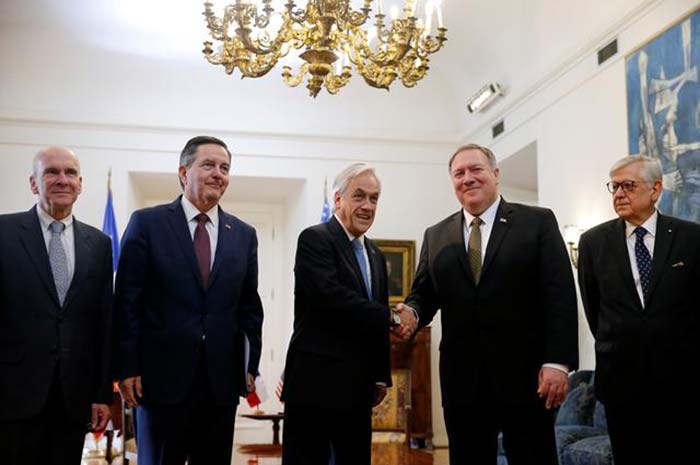SANTIAGO, (Reuters) – U.S. Secretary of State Mike Pompeo on Friday defended sanctions on Venezuela and said the United States would not “quit the fight” in the socialist-run Latin American nation which is spiraling into deepening economic and political crisis.
Pompeo is on a three-day trip to Chile, Paraguay and Peru, a clutch of fast-growing countries in a region where Washington’s concerns are focused on China’s growing presence as well as the Venezuelan crisis.
“The United States and its allies will not quit this fight,” he said during an event in Chilean capital Santiago, adding that the country would keep supporting Venezuelans “courageously standing up for democracy in their home country.”

Washington is pressuring President Nicolas Maduro to step down and urging more countries to join the coalition supporting opposition leader Juan Guaido. South America has seen a political shift in recent years towards the right, and most nations have backed Guaido.
“It’s a historic opportunity when you have all but a handful of countries that are truly market-driven, democratic in ways that you haven’t had in South America for decades,” Pompeo told reporters earlier en route to Santiago, where he met with Chilean President Sebastián Piñera.
Pompeo will travel later on Friday to Paraguay, the first visit by a U.S. secretary of state to the country since 1965, a gesture experts say underscores U.S. commitment to the region.
On Sunday he is set to visit Cucuta, a Colombian border city receiving significant numbers of Venezuelan migrants fleeing hunger and violence in their homeland.
U.S. ‘TRYING TO HELP’
Washington has imposed a raft of sanctions against Maduro’s government in an attempt to dislodge him from power.
On Friday, it added four firms and nine ships to its blacklist.
Critics have warned that heavy sanctions could hurt ordinary Venezuelans, already suffering from hyperinflation and food and medicine shortages. Pompeo said the people recognized the United States was not to blame for the country’s crisis.
“I think they understand who the malign actor is here and I think they’ll see all the countries in the region, including the United States, as truly trying to help them,” he said.
Maduro blames U.S. sanctions for the country’s economic problems and dismisses Guaido as a U.S. puppet. While most Western nations have recognized Guaido as head of state, Russia, China and Cuba have stood by Maduro.
Pompeo on Friday accused China of aiding Venezuela’s economic collapse by bankrolling Maduro’s government and said Russian troop presence in the country was an “obvious provocation.”
Working under a U.S. warrant, police in Spain arrested on Friday a former general and close ally of Maduro’s predecessor Hugo Chavez.
The former general, Hugo Carvajal, has thrown his support behind Guaido and is expected to be willing to cooperate with U.S. officials and share a “treasure trove” of information, a senior U.S. official told Reuters.
CHINA PIVOT
Pompeo is also seeking to highlight the gains from economic and trade cooperation with the United States, whose regional influence has been increasingly challenged by China.
Asked about China in Santiago, Pompeo warned about “predatory” lending practices and “malign or nefarious” actions, mirroring criticism previous U.S. officials have made about China during Latin America trips.
“Make no mistake about it, China’s trade activities often are deeply connected to their national security mission, their technological goals, their desire to steal intellectual property, to have forced technology transfer, to engage in activity that is not economic,” he said.
China, whose booming economy over the past two decades has driven up demand for raw materials, is already the top trade partner for nations from tiny Uruguay to Brazil, Latin America’s largest economy and the world’s top soybean exporter.
The pivot by Latin American countries towards China for financing has alarmed Washington.
U.S. President Donald Trump’s December 2017 national security strategy said China was seeking to “pull the region into its orbit through state-led investment and loans.”
Chinese foreign direct investment (FDI) in the region has risen by $70 billion since 2012, according to the Adrienne Arsht Latin America Center. While the United States remains the largest source of FDI, its share fell to 20 percent in 2016 from 24 percent in 2012, according to the Economic Commission for Latin America and the Caribbean.








